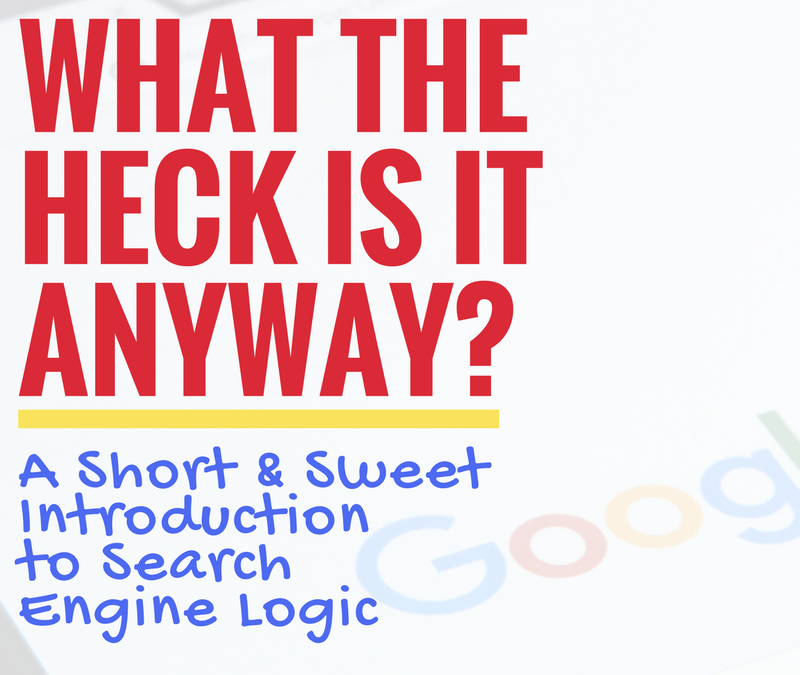As an Upstart Internet digital marketer, I see a lot of CEOs over-spending on ineffective marketing efforts. Companies who are actively seeking growth can’t afford to waste their resources, but I see it everyday. You don’t have the time or money on-hand to invest in growing the knowledge, or cultivating the skills that it takes to truly optimize your online presence for Search Engines. Instead, you use paid ads and set them on cruise control.
Danger Will Robinson! Over time, this becomes a marketing money pit. You’re paying to compete for placement and it gets pricier over time. You let your ROI slip without even realizing it, simply because of your site can’t compete organically. One usual suspect in these crimes of ignorance? Search Engine Optimization (or a lack thereof)
Search Engine Optimization is actually too technical and complex for a brief intro, but every business owner should at least understand how Search Engines work, and what they can do for their business.
So what do search engines do exactly?
In short – Search Engines want to provide the users with a list of webpages that are the most relevant and useful for any given term or phrase.
Everyone with a public website wants traffic. Search engines like Google review webpages to record their content, and decide their validity and relevance. They want to determine the value of each page in reference to certain search subjects or terms. Then using these assigned values, they rank the pages in what are called “organic” search rankings. Basically, organic rankings are the most valid and authentic calculations of a site’s relevance.
Sounds great but how do they do that?
Since Search Engines don’t have the time or resources for humans to scour every page on the internet, and grade them on aspects like relevance, usefulness, validity, safety, and popularity, they use “Indexing” “Crawlers” and “Algorithms.”
Search Engine Indexing – When search engines navigate through the internet they copy public webpages and data about the page contents into their own “index,” which they reference to create search results. It’s kinda like the pages in the back of a science textbook. Looking for info on spiders? The search engine flips to “spiders” in it’s index and it sees all of the pages that have content related to spiders. Then it puts them all together into a list for you to browse.

Web Crawler – A web crawler is like a spider-like robot that lives on the internet. It moves through the internet via the links between websites. Lets call him Spidey.
Technically, Spidey is a software program that moves from webpage to webpage, and copies each page to the search engine’s index. Then Spidey crawls through the hyperlinks in the content of each page to find and index other webpages while recording the data about those interconnections (all the connections form Spidey’s Web, get it? haha)
Web crawlers are crawling the internet around the clock to index each page, then send that data back to the search engine’s servers where they determine rankings by the pages’ perceived values. These values are calculated by Search Engine Algorithms.
Search Engine Algorithms – Algorithms are computer programs that determine how valuable or relevant a webpage is to certain search terms or phrases. They use hundreds of bits of data about a webpage to calculate the final ranking, and the algorithms are constantly changing to improve their ability to assign the right values to pages consistently.
Thats more complicated than I thought… now what?
You can’t predict exactly what page-aspects a Search Engine is using to determine your ranking. The formulas are always updating, so it’s best to work towards actually being the best search result for the key terms you’re targeting, keeping Search Engine logic in mind. For instance – write content that your target market will want to read, and make sure to mention the keyword, for which they would search, multiple times.
After that, the next steps of Optimizing your website for Search Engine rankings are SUPER complicated, so for the sake of brevity, we’ll talk about that in future articles.
2017 and beyond!
2017 is going to be a big year for the internet, and changes are coming soon. Web users are now conducting most of their online searches from mobile devices, so a mobile-friendly and well designed website is Priority Uno. Search Engines can be expected to put increasing emphasis on mobile indexing. This means that the mobile version of your website, not just the desktop version will be determining search rankings.
Google has begun to experiment with Mobile-first indexing, which means that they’re going to be using the mobile version of your website FIRST to determine your rank. This can be expected to go into affect in 2017, so folks, get your phones out and take a look at your website!



